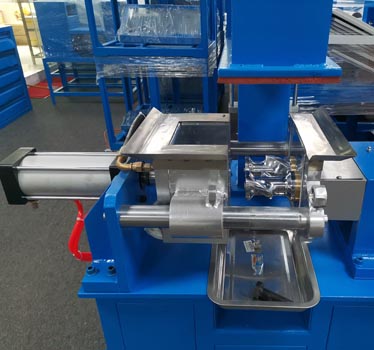A Lab Internal Mixer, also known as a Laboratory Banbury Mixer, it is a small-capacity, closed-chamber mixing and high-shear mixing machine featured with two counter-rotating rotors.
The Lab Internal Mixer is specially designed to simulate the mixing and kneading process before large-scale production , it provide researchers with accurate data for material development, process optimization, and quality control
When these two rotors begin rotating , they generate high shear and compression forces to compound materials, which ensure uniform dispersion and efficient mixing of polymers and additives. During mixing process, the compound materials are mixed fully and evenly under controlled temperature, pressure, and time, allowing precise replication of industrial production conditions on a laboratory scale.
Different from open-type mixing equipment ,which are named as two roll open mixing mill , the lab internal mixer offers enclosed, high-shear mixing, which thus lead to better dispersion, homogenization, and control over temperature and pressure. It is widely used in rubber, plastic, and polymer formulation research.
What Is a Lab Kneader?
A Lab Kneader, also known as a Laboratory Banbury Mixer or Dispersion Kneader, it is a compact mixing device with a closed-chamber, high-shear mixing machine .
The lab internal mixer machine feature with twin Z-shaped blades (sigma blades) , which generate shearing and compression action to knead, mix, and disperse the compound material fully and evenly in the W-shaped chamber.
Such lab internal banbury mixer machine is widely used for compounding rubber, plastics, and various polymer materials in small batches.
This type of mixer is suitable for viscous, pasty, or semi-solid materials, making it widely used in rubber, silicone, sealant, adhesive, plastic, and chemical industries.
Want To Learn More Comparison Applications of Lab Kneaders and Laboratory Mixing Mill Equipment ?
Working Principle of a Lab Kneader
The working principle of a lab internal mixer is based on shear and compression forces generated by the rotors inside a closed mixing chamber:
Feeding Material :
The raw materials (rubber, polymers, resins, fillers, colorant, additives, pigments, etc.) are loaded into the chamber of banbury type internal mixer through the top or front loading port.
Kneading & Mixing Process:
Two sigma blades rotate in high-speed opposite directions at different speeds, producing strong shear and frictional heat that softens, plasticizes, and disperses compound materials evenly. The combined motion provides intense mixing and uniform dispersion.
Temperature & Pressure Control:
The banbury internal kneader mixer is equipped with a heating/cooling jacket which maintains a constant mixing accurate temperature through a cooling or heating jacket ( usually via water, oil, or electric heating ) to prevent material degradation — it is essential for thermosensitive materials. And the hydraulic or pneumatic ram applies downward pressure to keep materials in contact with the rotors, improving mixing uniformity.
Discharging of Compounds :
Once the mixing cycle as preset mixing time is complete, the chamber tilts hydraulically or manually, and the compound is discharged for testing or forming, for further analysis or processing
Applications of Lab Internal Mixer
The Lab Internal Mixer equipment is one of the most versatile mixing equipment for research, testing, and small-scale production in various material industries, including as follows :
1. Rubber and Elastomer Compounding
The most common use of laboratory internal mixers is in rubber R&D formulation and material quality testing. It helps developing and testing new rubber formulations for tires, seals, hoses, and industrial rubber products. And also it help to measure the dispersion quality of carbon black, silica, and other fillers.
In polymer industry ,it help to evaluate the compatibility of polymers, fillers, and curatives before large-scale production.
Want to Learn Why Dispersion Kneader Works Perfectly for Color Masterbatch Material ?
With the help of laboratory internal mixer ,it can achieve several purpose as follows:
* Testing new rubber formulations.
* Measuring dispersion quality.
* Developing tire compounds, seals, and industrial rubber parts.
2. Plastic and Polymer Industry
In plastic industries, the lab internal mixer is used for blending polymers and additives such as stabilizers, colorants, and fillers.
It is also used for studying plasticization behavior, melt flow, and thermal stability . and developing thermoplastic elastomers (TPE) and polymer blends.
3. Master batch and Pigment Dispersion
Used for color master batch development and pigment dispersion testing, ensuring pigment uniformity and strong dispersion performance.
4. Composite Material Testing
Ideal for testing high-performance composites like rubber-plastic blends, fiber-reinforced materials, or thermoplastic elastomers.
Ideal for preparing and testing high-performance composites like rubber-plastic blends, fiber-reinforced materials, thermoplastic elastomers, or fiber-filled materials, in order to analyze and study the effect of filler ratios and processing parameters on material strength and flexibility..
5. Academic and Institutional Research
Universities and research institutes utilize the lab internal banbury mixers for teaching, training, and experimental studies in polymer science and materials engineering.
In conclusion , the small Laboratory Internal Mixer is an vital tool in modern laboratories for material research and product innovation.
it is widely used in academic and industrial research to prepare small quantities of polymer blends and compounds for polymer, rubber, synthetic rubber, hot melt adhesive ,plastic and various low-viscosity materials research.
By providing precise control over mixing parameters, it allows researchers and manufacturers to test best formulation to develop better, more consistent, and higher-quality materials.
Want To Learn More The Types of Dispersion Kneader Machines ?
At Simptek , we design and supply high-performance Laboratory Internal Mixers for various industries ,they are available from 0.5litre lab model to 150 litre for industriao productiion — offering durability, precision, and easy operation for your R&D and pilot-scale needs.







